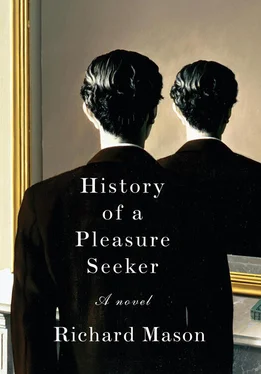His mother brought him his supper and was surprised by the mood she found him in. She had spent the afternoon feeling treacherous for not dismissing Piet Barol at once and was pleased to see her son looking so much better. Her heart was easier when she left him; and when Maarten said “I suppose I should go up and see him,” she advised him to leave it a day and called Constance to the drawing room to tell them amusing stories.
Eight hours after saying his prayers with Piet, Egbert did something defiant. He took a warm bath. He had not had one since he was eight years old and the experience was wonderful. He had grown used to fearing water. To take pleasure from it was transformative. He lay in the bath until his fingers shriveled, and when it cooled he added more hot water. The well-being this inspired made him admit that none of his other tutors would have dared to do what Piet had done: they had all been too scared of him. Very gradually, he started to be glad that he had not brought about Mr. Barol’s removal from the house; and when he got out of the bath he was shivering — not with cold, but with the audacity of the idea that had come to him.
Perhaps Piet Barol could save him.
Egbert Vermeulen-Sickerts wished desperately to be free of his family’s claustrophobic, demanding house, from which he glimpsed nothing of the outside world beyond what his sisters told him of their impossibly brilliant lives. As he dried, he examined every inch of his body and found no trace of injury. This confirmed the creeping realization that the Shadowers were powerless without him to do their bidding. He went to bed and said his prayers but did not sleep. Tantalizing possibilities were shining in his head. For three hours he gathered his courage, then as the entrance hall clock chimed midnight he asked his masters for permission to tell Piet everything.
The very suggestion provoked a menacing chatter in the shadows of the room, in the shards of white light sent through the chink in the curtains by the moon. But Egbert bargained with a new confidence and insisted with a metal inherited from his father. By dawn a deal had been reached: Piet Barol could be brought into the secret, but only if he passed the Test of the Entrance Hall Floor.
Three weeks later, Maarten and Jacobina left for England to join the Lusitania on her maiden voyage to New York, seen off from the quayside at Liverpool by 200,000 sightseers. September had already begun. If the hotel was to open as planned on the first day of October, Maarten knew he would have to see to its completion himself. Mr. Dermont had proved ominously hard to reach by telephone or cable. The only information easily available was that contained in the decorator’s bills, which had reached new heights of absurdity. In the six weeks since Maarten’s departure from America, two hundred further gold-plated taps had been ordered, eighteen hundred gilt-edged plates (for which no discount had been sought or achieved!). And although the Knickerbocker Trust Company had agreed to extend his credit by $150,000, this was far from sufficient.
Three days before he sailed, Maarten had sent thirty of Piet’s drawings to a Zurich dealer whose discretion was total. He did not intend to sell the pieces but needed accurate valuations as collateral for the loans he would be obliged to seek from his Amsterdam friends.
Father and son parted stiffly, each daunted by crises they did not confide. When the servants had dispersed, Egbert followed Piet into the dining room and said, “I will answer your question, Mr. Barol, about the music. But only if you pass a test. Please select a number between one hundred and twelve hundred.”
It was the first time Egbert had initiated a conversation since the episode on the cobblestones. Piet was relieved. “One hundred and seventy-eight.”
The boy looked pleased. He considered any choice beneath two hundred achievable for a novice. “You mustn’t ask me anything. I can only explain if you succeed. It is important you step on the tiles in the order I give you and don’t make a mistake, or you shall have to start again from the beginning.”
“I’m ready for you.”
“Start with white, please.”
The tiles on the entrance hall floor were small and Piet Barol’s feet were large. As Egbert called the colors he stepped from one to the next, smiling at first at this childish game but then finding, as the boy’s tempo increased, that it was harder than he thought to obey him accurately. Piet’s forty-first step grazed the tile beside the one he had aimed for. “Begin again,” Egbert commanded. “You may only start six more times.”
“Otherwise what?”
“Otherwise you shall never know the secret.”
There was such calm certainty in the boy’s voice that Piet understood his future rested on his ability to hop from one foot to another, in a precise yet mysterious order, on the instructions of a child. It was absurd but he did not intend to fail. He tried harder, and the better he did the faster Egbert went — because the Shadowers were driving him on, willing Piet to stumble. He did, and was obliged to begin once more. Now he was sweating and wished he could remove his jacket; but any lapse in concentration led to error.
Piet made five mistakes, but on his sixth attempt he reached the 177th tile, a white one, and balanced on it at some distance from the schoolroom door.
“Now I’ll come to you.” Egbert too began to hop. The neatness of his footwork was impressive. He reached Piet and went five tiles farther on. “You need to step on black one more time and then immediately into the room. Aim for that one there.”
The tile the boy indicated was a foot away from the door but a stride and a half from where Piet was. Egbert stretched towards him. “Lean on me and jump! You’ll make it.”
Maarten had looked forward to spending two months alone with his wife in New York. He felt sure Jacobina would know how to handle Lionel Dermont and her presence would certainly enliven the meals he was obliged to consume with his associates. But his hopes of a rejuvenating, contented voyage foundered on the second day out. Complaining that the vibrations of the engines made her ill, Jacobina took to her cabin; and in the countless ways by which couples of long-standing communicate with each other, she made it plain to her husband that he had offended her.
Jacobina had had no contact with Piet Barol since the afternoon before the workers’ fête, and her body, accustomed to regular pleasure, did not take kindly to the abstinence imposed on it by Maarten. She had imagined that they would have a suite as usual and had relied on the refuge of a private sitting room. To be cooped up instead in a small compartment with a man who showed no inclination to touch her was maddening. It inspired an uncharacteristic small-mindedness, whose chief victim was Agneta Hemels — who found that there was no way she could dress her mistress’s hair satisfactorily or press her clothes to the standard required.
Maarten knew his wife was a good sailor and her insistence on permanent nausea first troubled and then annoyed him. He took to spending large parts of each day in the first-class smoking room, in the company of other men who wished to complain of their wives over a whiskey and soda. This offered temporary relief but it did not make him happy. Neither did the spectacle that awaited him at the southeastern end of Central Park: a hotel in name only; in fact a chaotic and costly building site where the curtains had been hung before the cornice work was complete; where there was no hot water beyond the fourth floor and no functioning kitchen in which to train the brigades of busboys and waiters whom Mr. Dermont had already engaged and was now paying to loiter and chew gum and set practical jokes.
Читать дальше












